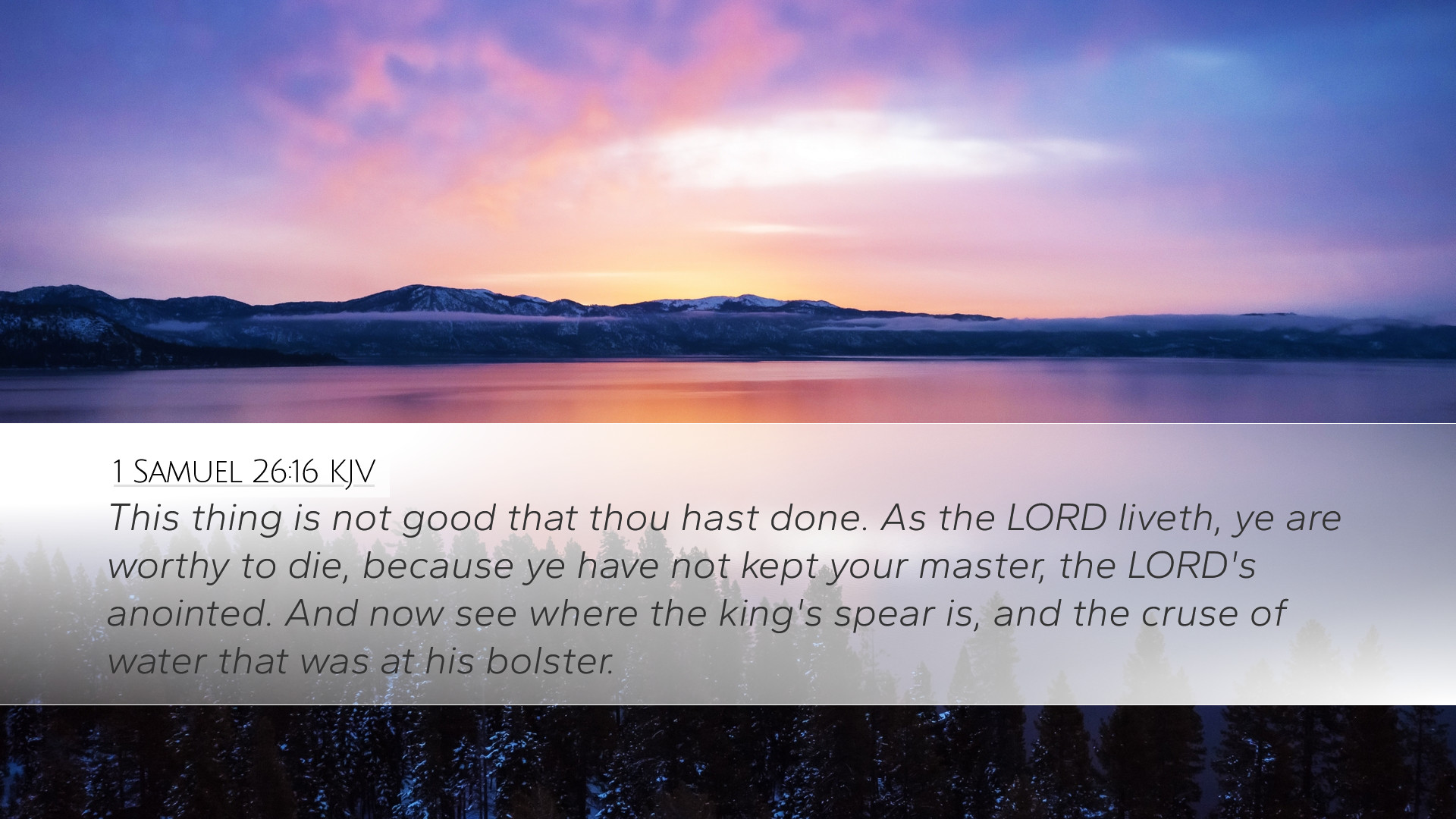Commentary on 1 Samuel 26:16
Verse: "This thing is not good that thou hast done: as the Lord liveth, ye are worthy to die, because ye have not kept your master, the Lord's anointed. And now see where the king's spear is, and the cruse of water that was at his bolster."
Introduction
This verse is situated within the narrative of David’s interactions with King Saul. It captures a significant moment where David confronts Saul's armies and their pursuit of him. The context is essential as it reflects themes of loyalty, divine ordination, and moral integrity. The words spoken by David reveal profound lessons about authority and divine purpose.
Historical Context
The interaction in 1 Samuel 26 highlights the tumultuous relationship between David and Saul. David is fleeing from Saul, who is determined to take his life due to jealousy and fear of losing his throne. In this setting, David and his men infiltrate the camp of Saul while he sleeps, an act that reflects both opportunity and the moral dilemma of assailing the Lord's anointed. David’s respect for God's choice in appointing Saul is pivotal in his decision to spare Saul's life.
Insights from Matthew Henry
Matthew Henry elaborates on the gravity of David’s statement, emphasizing the moral framework within which David operates. Henry posits that David’s condemnation of Saul’s troops for their negligence showcases a deep respect for God's anointed. He comments:
"David, being the man after God’s own heart, could not fail to defend the anointed of the Lord, despite personal safety being at stake."
Henry also underscores the psychological implications for David as he confronts Saul's guards, who have failed to protect their leader. Henry interprets David’s words as a reflection of his steadfast commitment to doing what is right in God's eyes, regardless of the human circumstances surrounding him.
Insights from Albert Barnes
Albert Barnes notes the practical implications of David's confrontation. He points out that this incident illustrates the broader theme of accounting for one’s actions. He writes that:
"David's rebuke is exemplary for all leaders. He exhorts them to consider not merely their physical protection duties but also their spiritual responsibilities."
Barnes draws parallels to contemporary leadership, suggesting that those in positions of authority must be vigilant and honorable in their actions. He cites the necessity of respecting God's chosen leaders, emphasizing that the consequences of neglect are severe, as reflected in David's stern warning.
Insights from Adam Clarke
Adam Clarke adds a nuanced approach by exploring the emotional landscape of this encounter. He underlines that:
"David's approach is steeped in wisdom and self-control, demonstrating an understanding of the delicate balance between justice and mercy."
Clarke further interprets the symbolism of the spear and the water, viewing them as powerful representations of authority and sustenance. The spear symbolizes the lethal force of the king, while the water signifies life and identity. He notes, “To illustrate the preservation of Saul’s life is to emphasize God’s control over life and death, reinforcing the sacredness of divine appointment.”
Theological Reflections
- The Nature of Divine Authority: This passage underscores the seriousness with which God’s appointments should be treated. David’s conduct illustrates a principle that extends to contemporary discussions regarding church and civil authority.
- Morality in Leadership: As outlined in the commentaries, there is a clear directive that leaders are accountable not just to their constituents but to God. The morality of actions taken in the name of authority is crucial.
- Respect for God’s Anointed: The act of sparing Saul denotes deep respect for God’s sovereign choices, challenging believers to consider their attitudes toward leaders even amidst strife and conflict.
- Justice and Mercy: David’s restraint serves as an instructive model for balancing justice with mercy, a theme echoed in the New Testament teachings.
Concluding Thoughts
In conclusion, 1 Samuel 26:16 serves as a rich source of insight for pastors, students, and scholars alike. The engagement between David and Saul highlights essential themes of leadership, accountability, and moral action. The commentaries of Henry, Barnes, and Clarke collectively encourage a deeper consideration of how divine authority is to be perceived and honored in our own lives. This ancient narrative continues to resonate, offering profound lessons for contemporary ethical challenges within both church and society.


